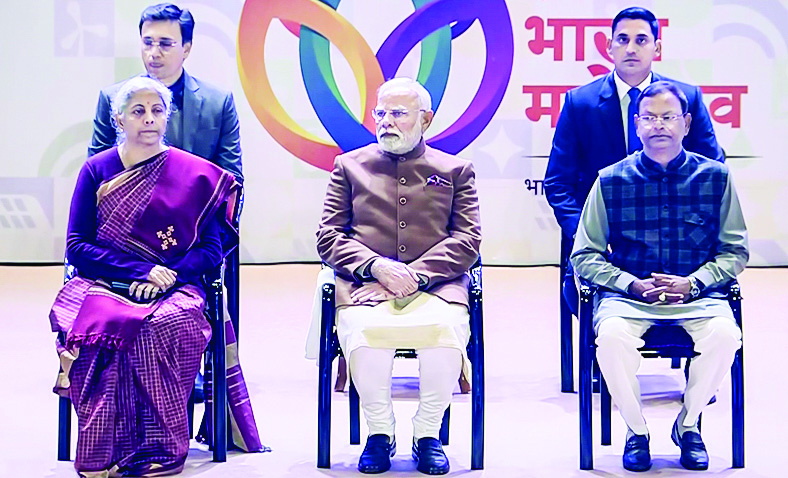New Delhi: Prime Minister Narendra Modi inaugurated the Grameen Bharat Mahotsav 2025 on Saturday, January 4, at Bharat Mandapam in New Delhi. Following the inauguration, the Prime Minister interacted with artisans participating in the event. Union Finance Minister Nirmala Sitharaman was also present at the event. During the ceremony, the Prime Minister was felicitated by Shaji KV, Chairperson of the National Bank for Agriculture and Rural Development (NABARD).
The Grameen Bharat Mahotsav will run from January 4 to January 9, under the theme “Building a Resilient Rural India for a Viksit Bharat 2047.” The event will feature discussions, workshops, and masterclasses aimed at improving rural infrastructure, fostering innovation, and creating self-reliant economies within rural communities. The event also aims to promote economic stability and financial
Reflecting on the challenges faced by rural communities, Prime Minister Narendra Modi remarked, “I feel fortunate to have spent my childhood in a small town, which gave me firsthand insight into the difficulties rural communities face. At the same time, it helped me recognise the immense potential of our villages. Despite their hard work, villagers often struggle to access opportunities due to limited resources.” The Prime Minister shared his government’s vision to uplift rural India.
“Since 2014, my focus has been on serving rural India every moment. Ensuring a dignified life for villagers is a top priority for my government. Our goal is to empower rural communities, create opportunities for growth, curb migration, and make life more comfortable for them. To achieve this, we have launched a comprehensive campaign to ensure basic facilities in every village,” the Prime Minister said.
Highlighting the achievements of his government over the past eleven years, the Prime Minister emphasised significant strides in rural development.
“Clean drinking water is now reaching every household in lakhs of villages. Over 1.5 lakh Ayushman Arogya Mandirs are providing better healthcare options. Through digital technology, we have connected the best doctors and hospitals to villages, enabling access to telemedicine,” he said. The Prime Minister stressed the importance of rural-focused economic policies.
“Strengthening the rural economy requires policies that cater to every section of the village. I am pleased that, in the last decade, our government has implemented special policies and decisions for all sections. Just a few days ago, the Cabinet approved the continuation of the PM Fasal Bima Yojana for another year,” he added.
Addressing the contribution of artisans and traditional workers, the Prime Minister said, “Villages are home to many who practice traditional arts and skills, contributing significantly to the rural and local economy. However, they were neglected in the past. To support them, we launched the PM Vishwakarma Yojana, providing opportunities for lakhs of Vishwakarma friends to thrive.”
He also highlighted the government’s decision to extend a One-Time Special Package on Di-Ammonium Phosphate (DAP) beyond the NBS subsidy of Rs 3,500 per tonne, ensuring affordable prices for farmers. The estimated budgetary requirement for this initiative is approximately Rs 3,850 crore.
“The global price of DAP has been rising sharply, but we resolved to shield farmers from this burden by stabilising prices through increased subsidies. Our government’s intentions, policies, and decisions are energising rural India with renewed vigour,” the Prime Minister said.
Before inaugurating the Grameen Bharat Mahotsav 2025, the Prime Minister emphasised the importance of prosperous villages in achieving the goal of a developed India.
In a post on X, he stated, “The more prosperous our villages become, the greater will be their role in realising the resolve of a developed India. In this context, I am privileged to inaugurate the Rural India Festival in Delhi today at 11 am. This event will significantly benefit the rural economy.”
The Mahotsav aims to empower rural women through entrepreneurship, foster collaboration among government officials, thought leaders, rural entrepreneurs, artisans, and stakeholders to create a roadmap for rural transformation.
It also seeks to encourage the adoption of technology and innovative practices to improve rural livelihoods while, celebrating India’s cultural heritage through vibrant performances and exhibitions.

